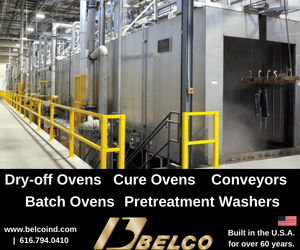In an age in which almost anything described as modern could also be described as 3D and fast, laser scanning could be considered the most modern method for measuring buildings. It is three-dimensional and fast, as well as precise, and that is why Dürr Systems AG says it is using the method worldwide in its paint shop modernization and expansion projects.
When the data collected from a laser scan is combined with plant plans in 3D, the resulting virtual models reveal potential challenges that can be addressed upfront. This can lead to shorter installation times, reduced conversion costs and smoother processes.
Laser scanning has revolutionized property surveying, says Marc Altmann, who works in the engineering department at Dürr. The laser beam records all relevant features of an existing building, including parapet heights, doors or cable ducts, as well as existing production elements. It can even produce non-contact measurement of hard-to-access areas from distances of as much as 130 meters. A software program then generates detailed images from the scan data.
“When working on brownfield projects, we are frequently confronted with the situation where there is either no documentation for factories and the sections they contain, or just analog original plans that have never been updated,” Altmann says. Laser scanning allows planners to create accurate, current outlines of these facilities.
Virtual Visit
Altmann says laser scans provide the ideal basis for planning. For large industrial buildings, the scan data consists of hundreds of individual scans that are precisely matched using reference points. He says they provide a way of reviewing if a customer’s vision is compatible with the structural conditions and engineering of an existing painting line or final assembly line.
Dürr uses the method as early as during the tendering phase of a project. 3D laser scanners measure and collect the data on an existing site, and software then processes the large volume of data and transfers it as photo-realistic images or videos to what it calls a “powerwall” at the Dürr campus in Bietigheim-Bissingen, Germany.
“We can take a virtual tour of any building, no matter where it is in the world, together with our customers here in the Powerwall room,” Altmann says. “This is much more visual than a plan on paper, and makes it possible to identify and discuss complications in advance and find a good solution. This means that a paint shop can be executed as planned with a high degree of certainty when it comes to quality, schedule and costs.”
Identifying Eventualities
The scans have an accuracy of ±2 mm, Altmann says, a level of precision that conventional measurement using a ruler or manual laser could not reach. Forgotten measurements can also easily be added on the screen.
“We create 3D CAD models for a project’s entire scope of delivery and merge them with the laser scans,” he says. “We then integrate our plant virtually on the PC into the reality of the building situation. This lets us see where design problems might occur, for example, due to an air duct in the way of the planned constructional steel work.”
In this way, engineers can visualize the entire layout of the plant with exact dimensions and interfering edges, as well as space for door openings and other requirements. Each individual part of the plant, as well as the plant in its entirety, can be visualized.
The highly precise laser scans also show features and measurements that cannot easily be seen with the naked eye, like small tolerances in the floor. This enables the design engineer to plan filler plates on the machines or specific minimum distances from the outset. It is not always possible to adapt the plant engineering to the building situation, however, Altmann points out.
“The laser scans let us see very clearly whether demolition will be necessary, which saves our customers time,” he says. “This makes conversion work much easier than doing them while installation is under way.”
Dürr says it is using laser scanning regularly in modifications and expansions to paint shops, which already come with a growing list of requirements and increasing demands for complexity. It has found that using this innovative measurement technology helps projects go smoothly on site.
For information, visit durr-northamerica.com.
Related Content
Cobot Enters Paint Industry With Safety at the Forefront
This collaborative robot is the first explosion-proof solution for the powder coating and paint arena that meets the U.S.’ stringent safety requirements. Its lead-through teach programming and tablet control are especially appealing to small shops with little proficiency in robotics.
Read MoreTTX’s Automated Conveyor Carrier System Offers Wireless, Flexible Operation
ACC system designed for reliable, consistent point-to-point movement of everything from small to heavy parts.
Read MoreMix of Automation and Skilled Employees Generates Quality
This Pennsylvania plating company’s general manager shares insights about being recognized as a Top Shop for several consecutive years as well as his thoughts about automation, customer service, hiring skilled workers, the challenges of installing a new line and more.
Read MoreIntumescent Coating Provides Up to 3 Hours of Fire Protection
PPG Steelguard 951 coating is designed to provide protection against fire and corrosion.
Read MoreRead Next
Delivering Increased Benefits to Greenhouse Films
Baystar's Borstar technology is helping customers deliver better, more reliable production methods to greenhouse agriculture.
Read MoreA ‘Clean’ Agenda Offers Unique Presentations in Chicago
The 2024 Parts Cleaning Conference, co-located with the International Manufacturing Technology Show, includes presentations by several speakers who are new to the conference and topics that have not been covered in past editions of this event.
Read MoreEducation Bringing Cleaning to Machining
Debuting new speakers and cleaning technology content during this half-day workshop co-located with IMTS 2024.
Read More






















